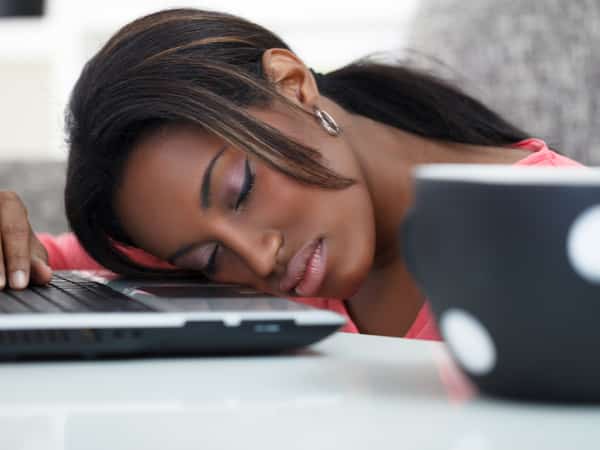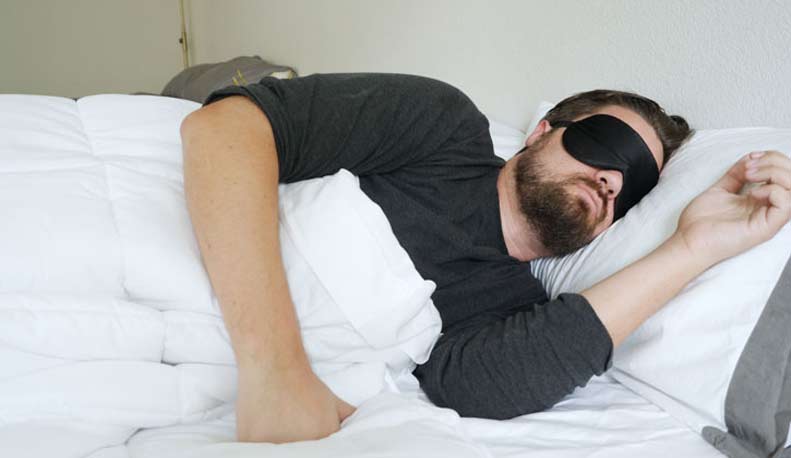As the holiday season approaches, many of us look forward to a nice, refreshing vacation that leaves us feeling well-rested and energized. But reality doesn’t always live up to that fantasy, especially if travel is involved.
Being away from home can make it hard to sleep—especially if you’re in a different time zone. Let’s see why that is, and what you can do to make your sleep as solid as your holiday spirit.
How Does Traveling Disrupt Your Sleep?
Whether you like traveling or not, it is a change from your regular routine. This can affect your sleep. Let’s take a closer look.
Travel Fatigue
Travel can be exciting, especially during the holiday season. But for many people, it also brings a lot of stress—both mental and physical.
Preparing for a trip can be exhausting, and it’s not always comfortable to sit in a plane, car, or train for long periods of time. It can be impossible to sleep when you’re sitting upright, and that can affect your sleep patterns.
Any or all of these factors can lead to travel fatigue, or tiredness caused by traveling.
Jet Lag
It can be hard for your body to adjust if you travel across several time zones. Your biological clock generally runs on a 24-hour cycle, and it doesn’t take time zones into account. Until your body catches up with the change in time zones, you may deal with jet lag and have a hard time sleeping.

Change in Sleep Schedule and Environment
Whether you switch time zones or not, you may operate on a completely different schedule when you’re traveling. It takes time for your body to adjust to a change in sleep schedule.
It can also be uncomfortable to sleep in a new environment, at least for the first day or so. Your brain typically ends up a little more alert to keep on guard for threats as you slumber. This is known as the “first-night effect”, and it leads to less restful sleep.
RELATED: How Does Christmas Morning Affect Your Family’s Sleep Schedule?
Sleep Tips for Travel
Here are some steps you can take to help you sleep better while traveling.
Avoid Traveling During Peak Times
Traveling during off-peak times can save you time. It will also help you avoid a lot of noise, commotion and stress. You may even have more space to stretch out, letting you sleep more comfortably.
Minimize Pre-Travel Stress
Plan ahead so you aren’t preparing for your trip at the last minute. Beyond that, try stress management techniques such as meditation, deep breathing, and yoga.
Don’t forget to take care of yourself by exercising, practicing hobbies, eating healthy foods, and getting a good amount of sleep. If you can, start easing your body into the sleep schedule you’ll have while traveling. This will lessen some of the shock and make the adjustment easier.
Pack Items that Remind You of Home
One of the most common reasons sleep can be hard while traveling is that you’re sleeping in a strange environment. You’ll be more comfortable if you’re surrounded by items that remind you of home—such as your own pillow or blanket.
Bring a White Noise Machine
Drown out distracting noises with a portable or travel-sized white noise machine. Don’t have one? Download an app like SimplyNoise on your phone. You could even try using a fan or listening to soft music.
Stay Hydrated
Everyone knows that not getting enough water can leave you feeling tired and groggy, which is the last thing we want while traveling. Staying hydrated will give you more energy. It’s no surprise, then, that some research has found that hydration and sleep go hand in hand.
Drinking plenty of water is particularly important when you’re on a plane, since research suggests that the dry, recirculated air of airplanes can contribute to dehydration.

Either way, make sure to spread out your water intake throughout the day, and don’t leave it until bedtime. In fact, you should generally limit the amount of water you drink in the two hours before bed. This way, you’ll be less likely to get up in the middle of the night to use the bathroom.
Travel Accessories to Help With Sleep
If you have trouble sleeping when you travel, you’re certainly not alone. The good news is that you can improve your sleep with a few simple tools.
Bring a Compact Travel Pillow and Blanket
If you can’t sleep on a plane (or other forms of transportation), it can throw your entire sleep schedule out of whack. Travel pillows and blankets can make public transportation more comfortable and help you get the sleep you need.
Earplugs or Noise-Canceling Headphones
Public transportation can be noisy, and so can certain travel destinations. Block out the noise with earplugs or noise-canceling headphones.
Use a Sleep Mask
People sleep best in dark environments. And on public transportation, the light can seem glaring at times. Keep it out of your eyes with a sleep mask.

Add a Meditation App to Your Smartphone
Stress can make it hard to sleep. If you’re feeling overwhelmed from travel, a meditation app can help you relax and unwind. This can set the stage for more restful sleep.
Take a look at our Calm vs Headspace comparison to find the best meditation app for you.
Bring Healthy Snacks
You might not be thinking about sleep if your stomach is growling. But before you eat several bags of potato chips, keep in mind that having too much salt can make it hard to sleep.
Your diet can have a big impact on your energy levels, so pack healthy snacks like apple sauce, veggie chips, tuna, and unsalted nuts.
FAQs
How does travel affect sleep?
Travel can interfere with your sleep schedule and make it hard to fall asleep. Some people experience travel fatigue and jet lag.
How do you regulate sleep when traveling?
You can regulate sleep when traveling by minimizing stress, practicing healthy habits, packing items that remind you of home, and bringing accessories like sleep masks. Also, use light exposure strategically to help your body adjust to a new timezone.
When should you sleep when traveling?
Crossing multiple time zones? You may want to keep your sleep-wake schedule tied to your time zone at home if you’re traveling for less than a couple of days. Otherwise, try to gradually adjust your sleep schedule to the new time zone.
